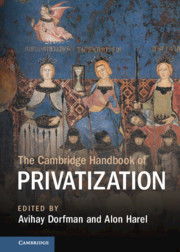Book contents
- The Cambridge Handbook of Privatization
- The Cambridge Handbook of Privatization
- Copyright page
- Contents
- Figures
- Tables
- Contributors
- Acknowledgments
- Introduction
- Part I On the Virtues of Public Provision (Agency-Based Approaches)
- 1 The Wrong of Privatization: A Kantian Account
- 2 Privatization, Efficiency, and the Distribution of Economic Power
- 3 Public and Private Ownership in Plato and Aristotle
- 4 Privatizing Criminal Punishment: What Is at Stake?
- 5 Justice and the Market
- 6 Outsourcing Border Control: Public Agency and Action in Migration
- 7 The Moral Neutrality of Privatization as Such
- Part II On the Virtues of Publicness as a Means to the Realization of Procedural Values (Process-Based Theories)
- Part III Outcome-Based Theories: On the Virtues and Vices of Public Provision as a Means to Promote Efficiency and Justice
- Index
6 - Outsourcing Border Control: Public Agency and Action in Migration
from Part I - On the Virtues of Public Provision (Agency-Based Approaches)
Published online by Cambridge University Press: 27 August 2021
- The Cambridge Handbook of Privatization
- The Cambridge Handbook of Privatization
- Copyright page
- Contents
- Figures
- Tables
- Contributors
- Acknowledgments
- Introduction
- Part I On the Virtues of Public Provision (Agency-Based Approaches)
- 1 The Wrong of Privatization: A Kantian Account
- 2 Privatization, Efficiency, and the Distribution of Economic Power
- 3 Public and Private Ownership in Plato and Aristotle
- 4 Privatizing Criminal Punishment: What Is at Stake?
- 5 Justice and the Market
- 6 Outsourcing Border Control: Public Agency and Action in Migration
- 7 The Moral Neutrality of Privatization as Such
- Part II On the Virtues of Publicness as a Means to the Realization of Procedural Values (Process-Based Theories)
- Part III Outcome-Based Theories: On the Virtues and Vices of Public Provision as a Means to Promote Efficiency and Justice
- Index
Summary
Non-state actors are ubiquitous in effecting border control. Private security companies (PSCs) are involved in deterring prospective irregular migrants from reaching a border, apprehending them when they enter, and then detaining and deporting them. PSCs provide not only agents of border control but also the increasingly sophisticated technologies of surveillance and deterrence. Treating irregular migration as a security concern lends itself to the expanding use of PSCs – arguably, a way of framing irregular migration that is itself encouraged by PSCs. The global border security market is, by some estimates, expected to grow to 29 billion euros by 2022. At the other end of the spectrum of organisational sophistication are civilian gatekeepers: individuals tasked, by law and upon pain of penalty, with monitoring and reporting on migrants they encounter in the course of their work – as doctors, university professors, and employers. In between are myriad other individuals and entities – airline agents, charities, and supranational organisations – that are independent of the state but pressed into its service, enforcing its borders and realising its migration policies.
Keywords
- Type
- Chapter
- Information
- The Cambridge Handbook of Privatization , pp. 102 - 116Publisher: Cambridge University PressPrint publication year: 2021
- 1
- Cited by



